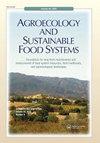Is there an agroecology movement in the USA?
IF 2.6
3区 农林科学
Q1 AGRICULTURE, MULTIDISCIPLINARY
引用次数: 0
Abstract
This question was uppermost in the minds of the 100 participants at the recent “Agroecology Summit” held May 23-25, 2023, at the Elms Center in Excelsior Springs, Missouri, outside of Kansas City. This is also a question I have asked myself many times in my role as Editor of Agroecology and Sustainable Food Systems, and wondering why such a small percentage of the papers submitted to our journal comes from agroecological research carried out in the USA. The Summit was organized to address this question – are we a movement? The key concept that drove the organization of the Summit is also a key concept of agroecology -diversity. Diversification through the process of cocreation of knowledge coming from multiple stakeholders in the food system in order to create a diverse pathway for the scientific field of agroecology to lead/follow. Diversification through integrating disciplines, approaches, ideologies, belief system, and cultures to achieve true transdisciplinarity. Diversification through many voices identifying priorities in agroecology so we can move beyond isolation and achieve full collaboration in the movement. Diversification through the transformation of food systems in the USA that respects multiple visions, beliefs, cultures, goals, and dreams. All of these “ways of knowing” and “ways of being” contributed to bringing together a remarkable diversity of participants. Through a process of an opening keynote presentation, panel discussions, break-out groups, report backs of key ideas, and wrap-up discussions, a dynamic and evolving vision of the current status and future development of agroecology in the USA took shape. The keynote and four panels included the following:美国有农业生态学运动吗?
在最近于2023年5月23日至25日在堪萨斯城外密苏里州Excelsior Springs的Elms中心举行的“农业生态学峰会”上,100名与会者最关心的问题是这个问题。这也是我在担任《农业生态学与可持续粮食系统》杂志编辑期间多次问自己的一个问题,我想知道为什么提交给我们杂志的论文中只有这么小的一部分来自美国的农业生态学研究。这次峰会是为了解决这个问题而组织的——我们是一场运动吗?推动首脑会议组织的关键概念也是农业生态学的一个关键概念——多样性。通过共同创造来自食品系统中多个利益相关者的知识的过程实现多样化,为农业生态学科学领域的领导/遵循创造一条多样化的途径。通过整合学科、方法、意识形态、信仰体系和文化实现多样化,以实现真正的跨学科性。通过多种声音确定农业生态学的优先事项,使我们能够超越孤立,在运动中实现充分合作。通过转变美国的食品系统实现多样化,尊重多种愿景、信仰、文化、目标和梦想。所有这些“认识的方式”和“存在的方式”都有助于将各种各样的参与者聚集在一起。通过开幕式主题演讲、小组讨论、分组讨论、关键思想报告和总结讨论,形成了对美国农业生态学现状和未来发展的动态和不断发展的愿景。主题演讲和四个小组讨论包括以下内容:
本文章由计算机程序翻译,如有差异,请以英文原文为准。
求助全文
约1分钟内获得全文
求助全文
来源期刊

Agroecology and Sustainable Food Systems
AGRICULTURE, MULTIDISCIPLINARY-GREEN & SUSTAINABLE SCIENCE & TECHNOLOGY
CiteScore
4.80
自引率
7.70%
发文量
73
期刊介绍:
Agroecology and Sustainable Food Systems is devoted to the rapidly emerging fields of agroecology and food system sustainability. By linking scientific inquiry and productive practice with transformative social action, agroecology provides a foundation for developing the alternative food systems of the future. The journal focuses on the changes that need to occur in the design and management of our food systems in order to balance natural resource use and environmental protection with the needs of production, economic viability, food security, and the social well-being of all people.
Agroecology and Sustainable Food Systems examines our current food systems from production to consumption, and the urgent need to transition to long-term sustainability. The journal promotes the study and application of agroecology for developing alternatives to the complex problems of resource depletion, environmental degradation, a narrowing of agrobiodiversity, continued world hunger, consolidation and industrialization of the food system, climate change, and the loss of farm land. The journal uses a food systems approach, and seeks experiences in agroecology that are on-farm, participatory, change-oriented, and backed by broad-based methodologies of sustainability analysis and evaluation.
 求助内容:
求助内容: 应助结果提醒方式:
应助结果提醒方式:


